Customer Feedback : Received!
Feedback Received! Thank you so much for your valuable feedback! Amy’s Eden QC Dept.
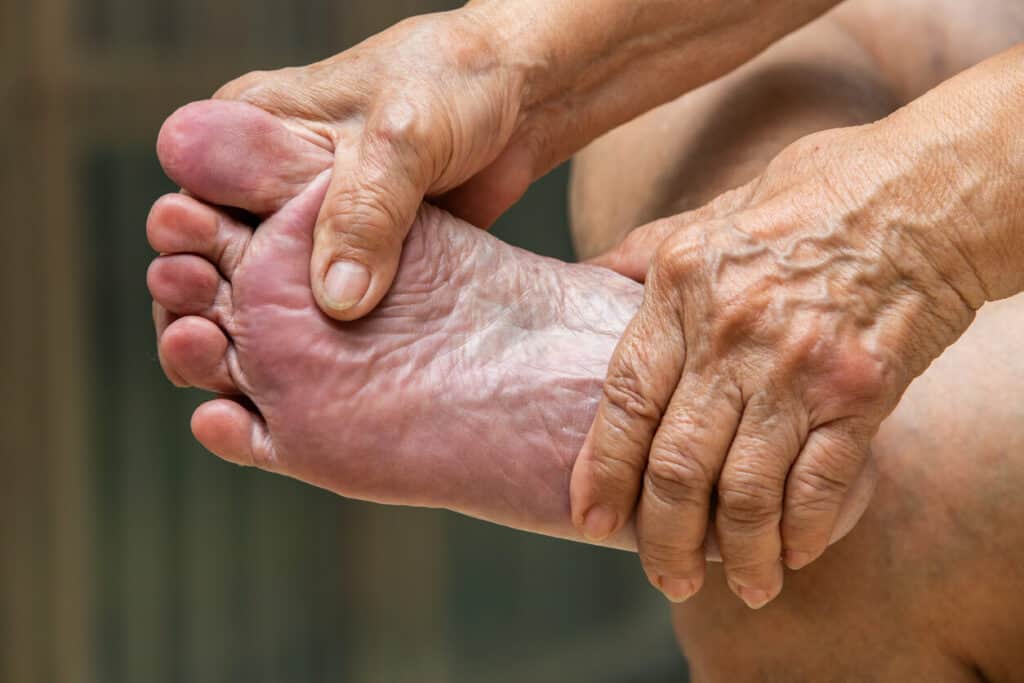
After a lifetime of standing, walking, and running, it’s no wonder why elderly people can begin to develop issues with their feet. As people get older, they are more prone to foot problems and might experience a decrease in circulation, particularly in the lower extremities.
This the reason why foot care is essential for your elderly loved one. Neglecting foot care can result in pain and discomfort, as well as an increased risk of falls which affects the quality of your loved one’s life.
However, focusing on caring for old people’s feet can improve balance, flexibility, and overall quality of life as they age.
Having cared for older adults long enough, at Amy’s Eden, we understand how important foot care for aging people is, and our caregivers are trained to provide adequate care for your loved one’s feet.
As we age, our body tends to show signs of wear and tear, including our feet. Many older people suffer from some form of foot disease and disorders affecting tendons, joints, and ankles. This can lead to the loss of small motor skills and affects our daily physical activities.
The following are some problems people can experience with their feet as they age.
As people age, their skin becomes drier and loses moisture. This can cause dry, cracked skin on the heel, which can be painful and increase the risk of infection.
These are areas of thickened skin that develop on the feet due to friction or pressure. Corns and calluses can be painful and make it difficult to wear shoes comfortably.
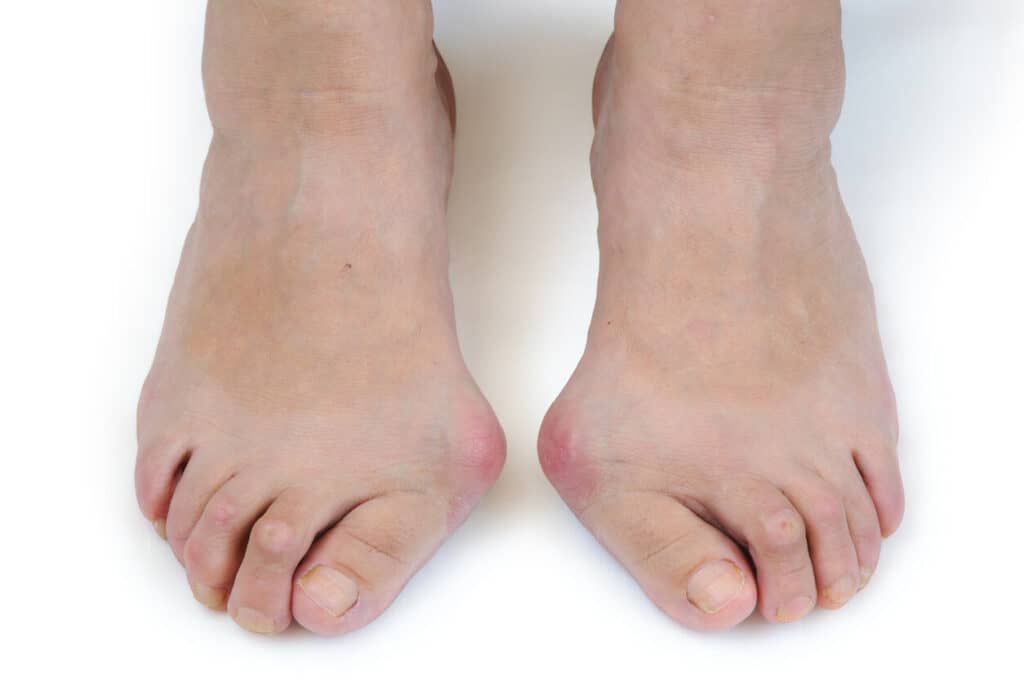
Bunions are painful bony lumps that grow at the point where your big toe meets your foot (the base). They can result in pain and may make it difficult to wear certain types of shoes. They mostly appear in women, can run in families, and are worsened by tight and narrow shoes like heels.
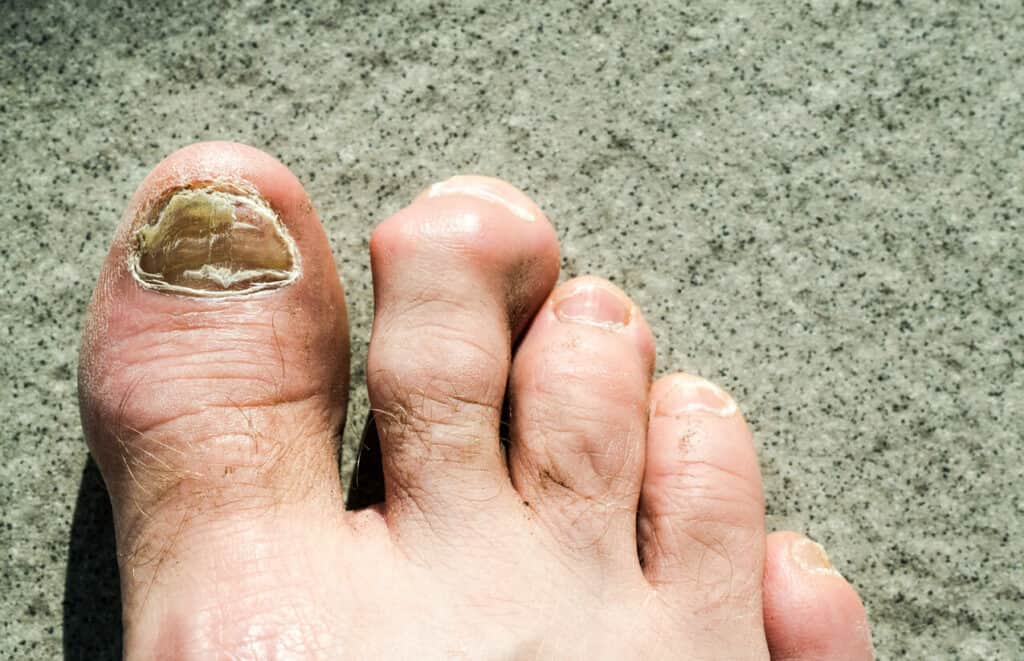
This is a deformity of the toe where the toe bends downward at the middle joint, causing a hammer-like appearance. It usually happens on the second toe after the big toe but can occur in the rest as well. Hammertoes can be painful, and corn and calluses can develop as it rubs against your shoe.
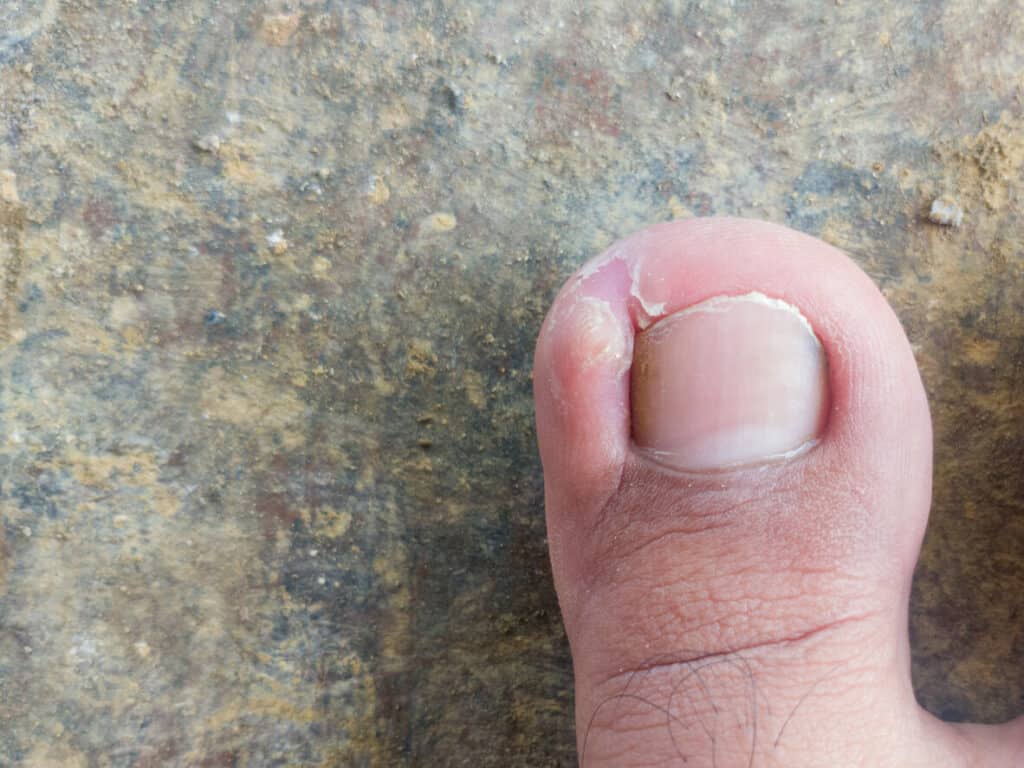
This occurs when the nail, especially on your big toe, grows into the skin. Although it can happen at any age, it’s more common in aging people. Your big toe may hurt, swell, and get infected.
If your loved one is always complaining of pain at the bottom of their feet, plantar fasciitis is mostly the culprit. This pain occurs when plantar fasciitis, a long ligament that runs along the sole of your feet, gets inflamed. This condition might make walking or standing for long periods difficult.
It’s essential to keep in mind that some foot problems may be pointers to underlying medical conditions, such as diabetes or arthritis.
If your loved one’s foot health is becoming a source of concern to you, please contact their doctor for a proper diagnosis and treatment. There are many new treatment resources available, including advice, management services, and surgeries that can treat foot disorders effectively. Some websites have a patient center page where you can find valuable information on foot health and treatment options.
If your loved one is experiencing foot pain, here are some effective but easy treatment options to help them find relief.
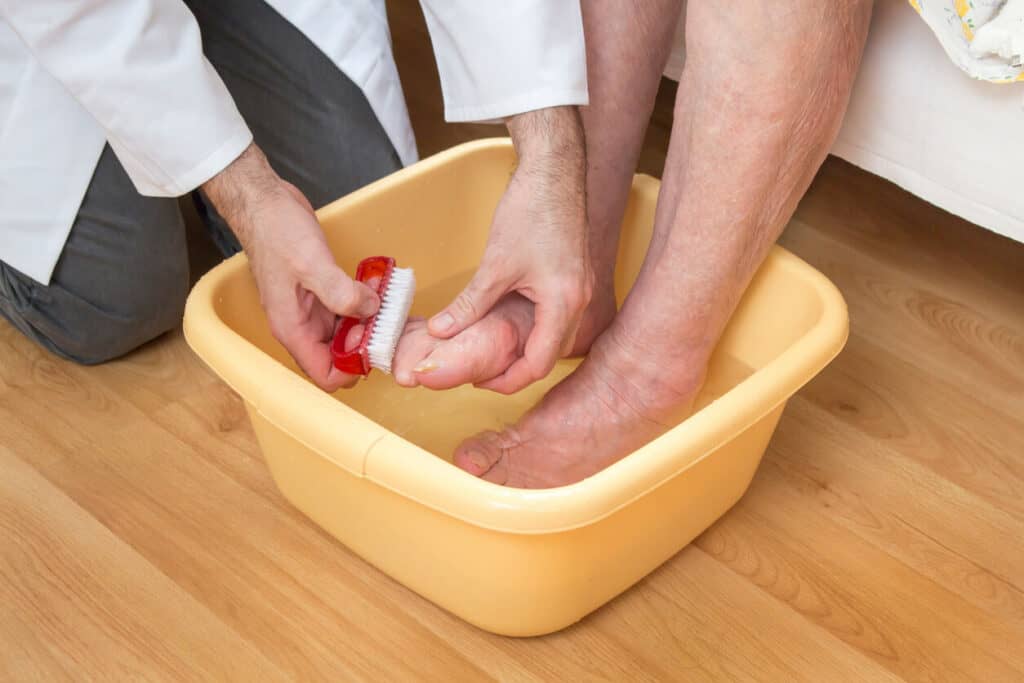
This can help soften the feet, making it easier to reduce corns and calluses. Epsom salts help soothe sore muscles in the feet.
A good foot massage can work wonders for older people’s feet. Massaging the feet helps improve circulation, reduce swelling, and soothe aching feet. It can also help the feet feel supple and soft.
If your loved one is experiencing foot swelling and pain, apply cold or hot packs. While cold packs help reduce swelling and inflammation, hot packs help soothe pain and improve circulation.
Simple foot stretching exercises like flexing the toes or feet or rotating the ankle can help improve blood flow around your loved one’s feet. Whether your loved one is experiencing a foot problem or not, this is very essential.
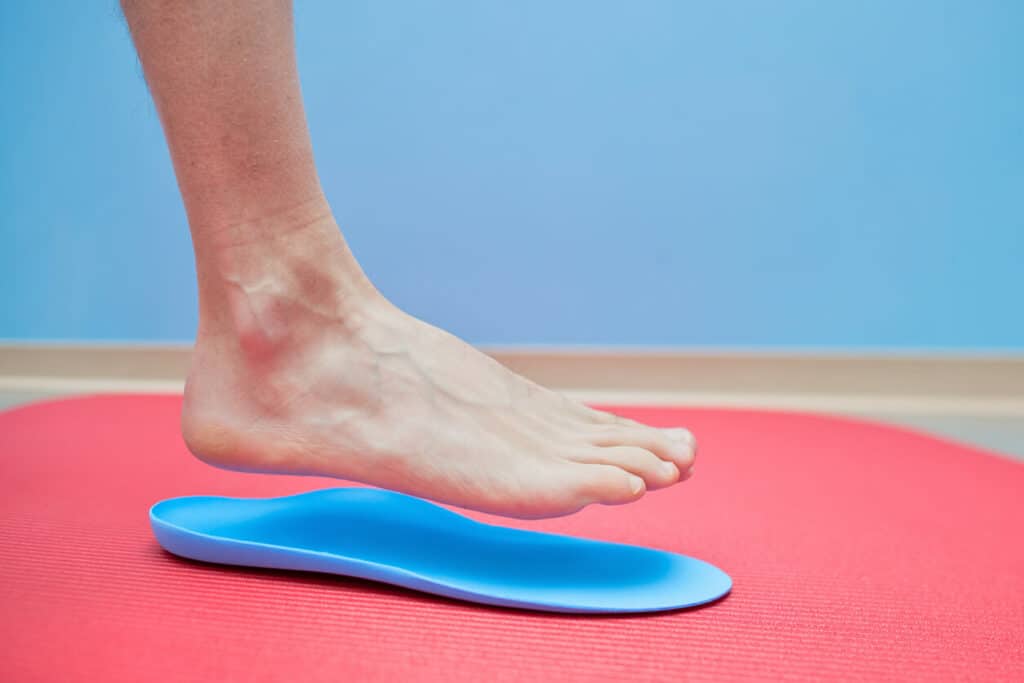
These can help cushion the feet and provide the right support. Since there are different types in the market, kindly consult your loved one’s physician to know which type will be ideal for their specific foot problem.
Elevating the feet above the heart level can help reduce swelling and improve circulation. Have your loved one prop their feet up on pillows while sitting or lying down to achieve this.
This can provide relief from pain and stiffness when used to massage the soles of the feet. All you have to do is gently roll the roller or ball back and forth while targeting specific areas that feel sore or tense. Foot rollers or balls help improve blood flow and reduce muscle tightness and tension.
The following care tips can be useful to prevent or minimize the risk of foot problems in your loved one.
Make sure your loved one is wearing the right footwear that provides support and comfort for their feet. Avoid shoes with narrow-toe boxes, high heels, or hard soles that can cause or worsen blisters, corn, or other foot conditions.
This can include keeping the feet clean and dry to prevent fungal infections, such as athlete’s foot. Encourage your loved one to dry their feet thoroughly after bathing or swimming and change their socks and shoes regularly to help prevent bacteria and fungi from growing.
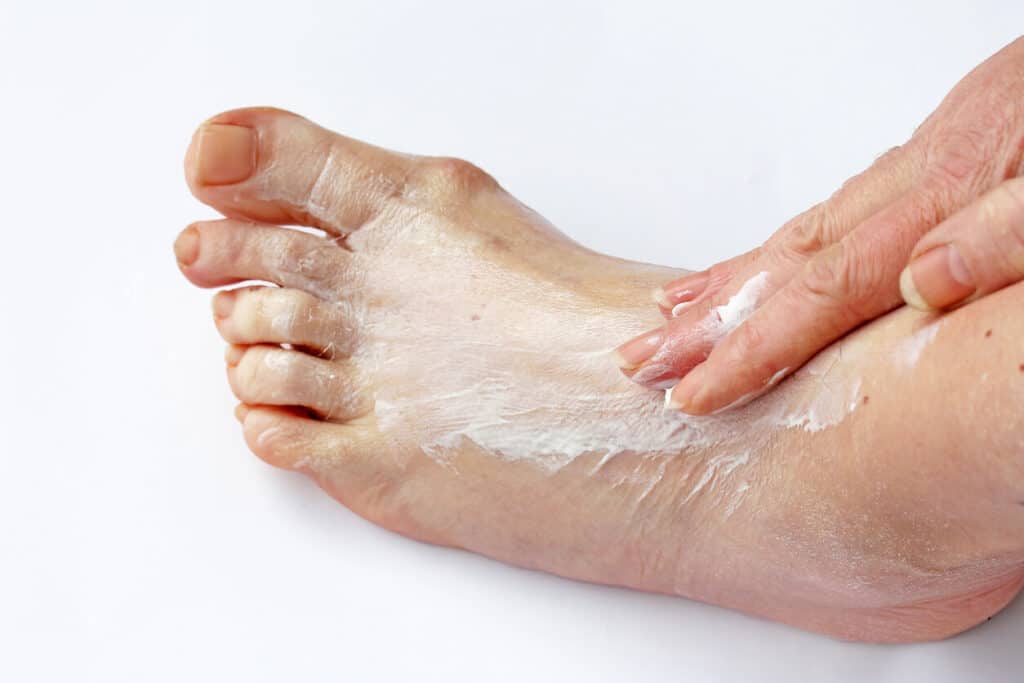
Moisturizing the feet regularly can help prevent dry, cracked skin, which can be painful and increase the risk of infection. Moisturizing can be done every day.
Use a moisturizing cream or oil specifically designed for the feet, and avoid applying moisturizer between the toes, which can create a moist environment that can promote the growth of bacteria and fungi.
Walking barefoot can expose the feet to various hazards, such as sharp objects, uneven surfaces, and hot or cold temperatures, which can cause injuries and infections. Older adults with conditions such as diabetes or neuropathy may not feel pain in their feet, making it difficult to detect injuries and infections.
Walking barefoot can also cause corns and calluses, which may hurt.
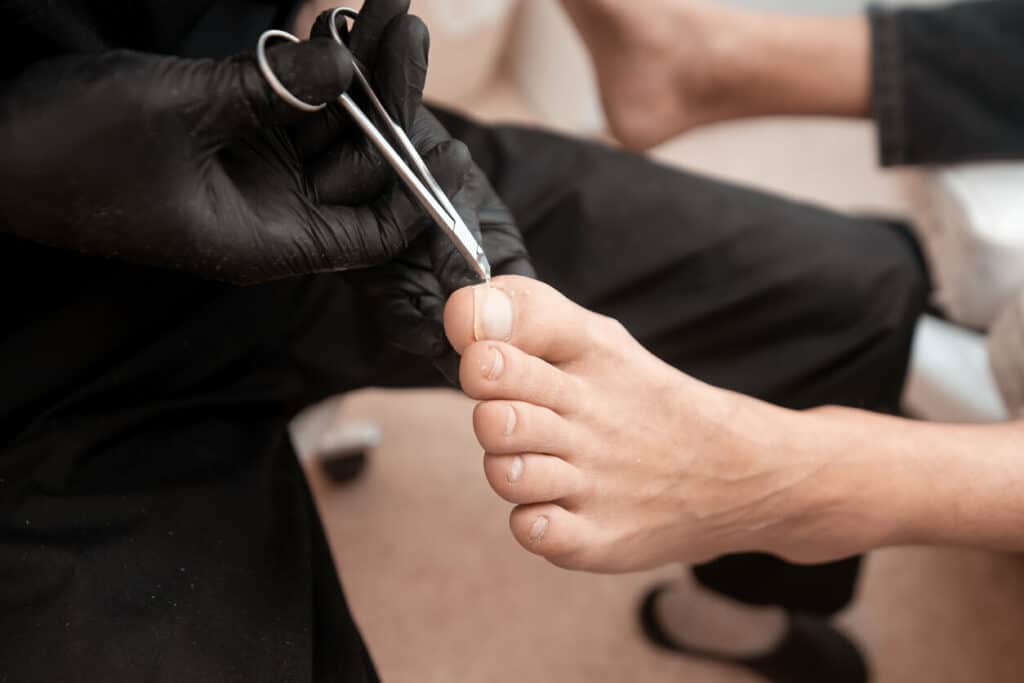
Trim toenails regularly and properly. Make sure to trim them straight and avoid rounding the corners to prevent ingrown toenails. Use proper nail clippers and avoid cutting your loved one’s nails too short.
Regular exercise can help improve circulation and reduce the risk of foot problems. Simple exercises like walking, swimming, or cycling can be beneficial for foot health.
Inspecting your loved one’s feet regularly for any signs of injury, swelling, or other problems can help catch foot problems early and prevent them from getting worse. If you notice any changes or have concerns about your foot health, be sure to speak with a healthcare provider.
Foot care is essential for older adults to improve the quality of their life. If your loved one is experiencing foot problems, you can try easy at-home treatments, such as soaking in warm water, massages, exercises, and other tips we have mentioned above.
Don’t forget to implement some of the care tips we talked about to prevent foot problems.
At Amy’s Eden, we consciously care for our resident’s feet and use all the care tips we have listed in this article. If you’re looking for caregivers who would provide exceptional care for your loved one as a child would for their parents, you can stop your search here.
Kindly reach out to us to learn more about how we can provide this care in your home or one of our assisted homes. We can’t wait to pamper and shower your loved one with care.
Get care >
Feedback Received! Thank you so much for your valuable feedback! Amy’s Eden QC Dept.
Hi ! How was your experience with us? We’re sorry for the bad experience. Let us know what went wrong, and we’ll fix it ASAP!
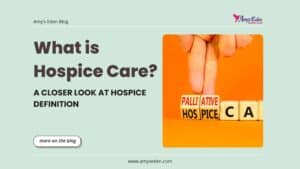
Ever wondered what hospice care really is? You’re not alone! It’s a term many of us hear, but don’t fully understand. Let’s clear up the

When your doctor announces that your loved one has a late-stage disease, it can feel like the world stops turning. The days that once felt


After a lifetime of standing, walking, and running, it’s no wonder why elderly people can begin to develop issues with their feet. As people get older, they are more prone to foot problems and might experience a decrease in circulation, particularly in the lower extremities.
This the reason why foot care is essential for your elderly loved one. Neglecting foot care can result in pain and discomfort, as well as an increased risk of falls which affects the quality of your loved one’s life.
However, focusing on caring for old people’s feet can improve balance, flexibility, and overall quality of life as they age.
Having cared for older adults long enough, at Amy’s Eden, we understand how important foot care for aging people is, and our caregivers are trained to provide adequate care for your loved one’s feet.
As we age, our body tends to show signs of wear and tear, including our feet. Many older people suffer from some form of foot disease and disorders affecting tendons, joints, and ankles. This can lead to the loss of small motor skills and affects our daily physical activities.
The following are some problems people can experience with their feet as they age.
As people age, their skin becomes drier and loses moisture. This can cause dry, cracked skin on the heel, which can be painful and increase the risk of infection.
These are areas of thickened skin that develop on the feet due to friction or pressure. Corns and calluses can be painful and make it difficult to wear shoes comfortably.

Bunions are painful bony lumps that grow at the point where your big toe meets your foot (the base). They can result in pain and may make it difficult to wear certain types of shoes. They mostly appear in women, can run in families, and are worsened by tight and narrow shoes like heels.

This is a deformity of the toe where the toe bends downward at the middle joint, causing a hammer-like appearance. It usually happens on the second toe after the big toe but can occur in the rest as well. Hammertoes can be painful, and corn and calluses can develop as it rubs against your shoe.

This occurs when the nail, especially on your big toe, grows into the skin. Although it can happen at any age, it’s more common in aging people. Your big toe may hurt, swell, and get infected.
If your loved one is always complaining of pain at the bottom of their feet, plantar fasciitis is mostly the culprit. This pain occurs when plantar fasciitis, a long ligament that runs along the sole of your feet, gets inflamed. This condition might make walking or standing for long periods difficult.
It’s essential to keep in mind that some foot problems may be pointers to underlying medical conditions, such as diabetes or arthritis.
If your loved one’s foot health is becoming a source of concern to you, please contact their doctor for a proper diagnosis and treatment. There are many new treatment resources available, including advice, management services, and surgeries that can treat foot disorders effectively. Some websites have a patient center page where you can find valuable information on foot health and treatment options.
If your loved one is experiencing foot pain, here are some effective but easy treatment options to help them find relief.

This can help soften the feet, making it easier to reduce corns and calluses. Epsom salts help soothe sore muscles in the feet.
A good foot massage can work wonders for older people’s feet. Massaging the feet helps improve circulation, reduce swelling, and soothe aching feet. It can also help the feet feel supple and soft.
If your loved one is experiencing foot swelling and pain, apply cold or hot packs. While cold packs help reduce swelling and inflammation, hot packs help soothe pain and improve circulation.
Simple foot stretching exercises like flexing the toes or feet or rotating the ankle can help improve blood flow around your loved one’s feet. Whether your loved one is experiencing a foot problem or not, this is very essential.

These can help cushion the feet and provide the right support. Since there are different types in the market, kindly consult your loved one’s physician to know which type will be ideal for their specific foot problem.
Elevating the feet above the heart level can help reduce swelling and improve circulation. Have your loved one prop their feet up on pillows while sitting or lying down to achieve this.
This can provide relief from pain and stiffness when used to massage the soles of the feet. All you have to do is gently roll the roller or ball back and forth while targeting specific areas that feel sore or tense. Foot rollers or balls help improve blood flow and reduce muscle tightness and tension.
The following care tips can be useful to prevent or minimize the risk of foot problems in your loved one.
Make sure your loved one is wearing the right footwear that provides support and comfort for their feet. Avoid shoes with narrow-toe boxes, high heels, or hard soles that can cause or worsen blisters, corn, or other foot conditions.
This can include keeping the feet clean and dry to prevent fungal infections, such as athlete’s foot. Encourage your loved one to dry their feet thoroughly after bathing or swimming and change their socks and shoes regularly to help prevent bacteria and fungi from growing.

Moisturizing the feet regularly can help prevent dry, cracked skin, which can be painful and increase the risk of infection. Moisturizing can be done every day.
Use a moisturizing cream or oil specifically designed for the feet, and avoid applying moisturizer between the toes, which can create a moist environment that can promote the growth of bacteria and fungi.
Walking barefoot can expose the feet to various hazards, such as sharp objects, uneven surfaces, and hot or cold temperatures, which can cause injuries and infections. Older adults with conditions such as diabetes or neuropathy may not feel pain in their feet, making it difficult to detect injuries and infections.
Walking barefoot can also cause corns and calluses, which may hurt.

Trim toenails regularly and properly. Make sure to trim them straight and avoid rounding the corners to prevent ingrown toenails. Use proper nail clippers and avoid cutting your loved one’s nails too short.
Regular exercise can help improve circulation and reduce the risk of foot problems. Simple exercises like walking, swimming, or cycling can be beneficial for foot health.
Inspecting your loved one’s feet regularly for any signs of injury, swelling, or other problems can help catch foot problems early and prevent them from getting worse. If you notice any changes or have concerns about your foot health, be sure to speak with a healthcare provider.
Foot care is essential for older adults to improve the quality of their life. If your loved one is experiencing foot problems, you can try easy at-home treatments, such as soaking in warm water, massages, exercises, and other tips we have mentioned above.
Don’t forget to implement some of the care tips we talked about to prevent foot problems.
At Amy’s Eden, we consciously care for our resident’s feet and use all the care tips we have listed in this article. If you’re looking for caregivers who would provide exceptional care for your loved one as a child would for their parents, you can stop your search here.
Kindly reach out to us to learn more about how we can provide this care in your home or one of our assisted homes. We can’t wait to pamper and shower your loved one with care.